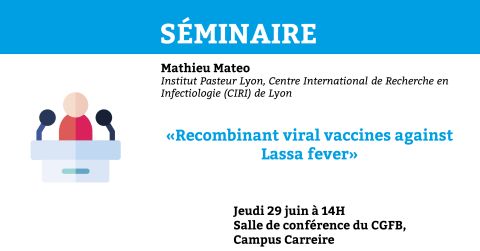"Recombinant viral vaccines against Lassa fever"
Dr. Mathieu Mateo is a Pasteur Institute young researcher with a renowned expertise in virology and vaccinology. He leads a team at the Pasteur Institute of Lyon deciphering the molecular determinants of Lassa Fever Virus pathogenicity. His team has also been instrumental in the development of novel innovative vaccination strategies to prevent Lassa Fever virus epidemics, which is the topic that he will discuss during his seminar. You will find bellow the abstract of his semina:
“Lassa fever hits West African countries annually in the absence of licensed vaccine to limit the burden of this viral hemorrhagic fever. We developed MeV-NP, a single-shot vaccine protecting cynomolgus monkeys against divergent strains one month or more than a year before Lassa virus infection. Given the limited dissemination area during outbreaks and the risk of nosocomial transmission, a vaccine inducing rapid protection could be useful to protect exposed people during outbreaks in the absence of preventive vaccination. We recently vaccinated non-human primates with MeV-NP 8 days before the challenge. We also tested the short-term efficacy of a hyperattenuated Mopeia recombinant virus MOPEVACLASV that we previously showed to be protective when administered one month prior challenge. Both vaccines conferred full protection against Lassa fever after a single shot of vaccine given 8 days before challenge. For both vaccines, the protection was characterized by strong T cell responses against the Lassa virus antigens. Control animals all died within 15 days of fatal Lassa fever. Both vaccines therefore constitute ideal candidates for further development. MeVLASV has already shown promising results in first-in-human phase I clinical trial and MOPEVACLASV is expected to follow the same path in a near future”.


